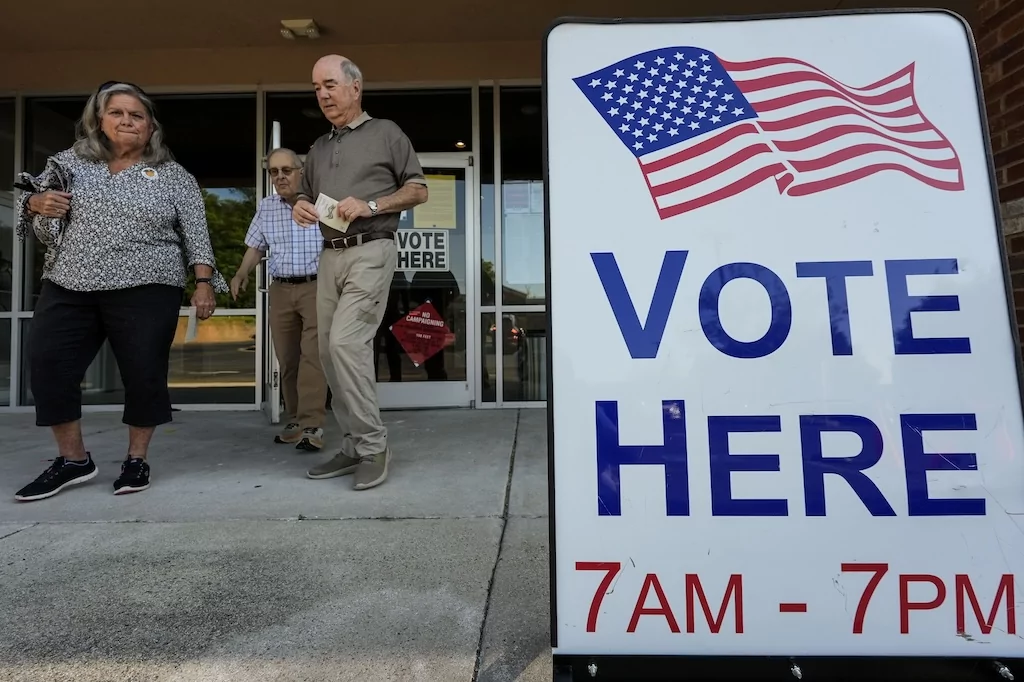

(The Center Square) – Voters will have the opportunity to vote certain measures into law this November.
A lot of measures.
When they receive their ballot, the measures proposed by legislators and other organizations, will be listed as propositions with a brief description.
At this time, there are 13 measures that have received the number of signatures needed to secure a spot on the ballot. What are they and what will it mean for Arizonans if voted into law?
Proposition 133 – Requiring Partisan Elections
This initiative would create an amendment requiring partisan primary elections in Arizona and prohibiting primaries where candidates compete regardless of party affiliation.
“The direct primary election for partisan offices shall be conducted in a manner so that each political party that has qualified for representation on the ballot shall be permitted to nominate for each office a number of candidates equal to the number of positions to be filled for that office in the ensuing general election, and all otherwise eligible candidates who are so nominated shall be placed on the ballot in the next ensuing general election,” reads the proposed amendment.
This would keep the current system where there are typically two primary elections for each office – Republican candidates and Democratic candidates – and the winning candidate in each party moves on to the general election to compete against each other.
Proposition 133 directly opposes another proposition that will be on the ballot – Proposition 140.
Proposition 140 – Eliminating Partisan Primaries
This amendment would do the exact opposite of Proposition 133. Prop. 140 would replace partisan primaries with an electoral system where voters can vote for any candidate regardless of the party affiliation of the candidate or the voter.
This would also allow the state legislature to decide how many candidates move on to the general election. For one winner races, it would allow two to five candidates to move on and if there are three or more candidates, ranked-choice voting would be enacted.
Ranked choice voting is where voters rank the candidates instead of voting for their top choice. Voters rank their candidates in order of preference and the candidate with the majority of votes wins. If there is no majority, the lowest ranked candidate is eliminated and the people who marked that candidate as their top choice will have their vote switched to their second pick, and so on until there is a majority.
“All primary election candidates for a given office will have the same signature requirements for ballot qualification,” reads the proposed amendment. “Eligible voters may vote for candidates regardless of party affiliation. The legislature may prescribe the number of candidates advancing to the general election. Prohibits using public monies for political party elections.”
Proposition 134 – Creating a signature distribution requirement for citizen-initiated ballot measures
At this time, the current law for citizen-led ballot initiatives requires 15% of qualified electors from anywhere in the state to sign the petition for state statutes, and 10% for a statutory amendment. Proposition 134 would require that the signatures be collected from all 30 legislative districts.
It would also require proponents of referendums to gather signatures from at least 5% of the qualified electors in each of the 30 legislative districts in the state.
Supporters of this measure say it will give areas outside of Maricopa County more of a voice in the process.
Proposition 135 – Allows the legislature to terminate a state of emergency
This proposition would create an amendment allowing the legislature to terminate a governor-enacted state of emergency or even regulate the governing powers of the governor during a state of emergency. It also requires that a state of emergency be immediately terminated after 30 days.
However, the legislature is able to extend the governor’s emergency powers if they see fit. This does not apply in cases of war, flood or fire.
The current law allows a governor to have complete authority during what they deem as a state of emergency. The governor has complete authority over all state agencies and has the ability to direct them to do what they think is best to address the emergency.
It would also require the governor to call a special session of the legislature if at least one-third of house members submit a signed petition requesting the session in order to remove or alter the governor’s emergency powers.
The measure is seen as a response to governor’s across the country extending emergency powers for months at a time during the COVID-19 pandemic.
Proposition 136 – Allows challenges to an initiative or amendment after filing
This proposition would create an amendment to the Arizona constitution that would allow a person or organization to challenge an initiative measure or constitutional amendment after it has been filed with the Secretary of State.
“Under current law the courts may not adjudicate challenges to the constitutionality of an initiative measure until after its been enacted by voters,” reads the legislative analysis of the proposition. “Proposition 136 would amend the Arizona Constitution to allow a person to bring an action in superior court to contest the constitutionality of a statutory initiative measure or a constitutional amendment proposed under the power of initiative at least one hundred days before the date of the election at which the measure or amendment will be voted on.”
Additionally, anyone can appeal the superior court’s decision within five days after the court enters the judgment. If it is determined that the measure violates the United States Constitution or the Arizona Constitution, the Secretary of State is not able to put the measure or amendment on the ballot.
Proposition 137 – Ends term limits for supreme court justices and superior court judges
This initiative will end the current four and six-year term limits for trial and appellate court judges and replace it with an unlimited term as long as they maintain “good behavior.”
“Proposition 137 would amend the Arizona Constitution to provide that judges and justices appointed through the merit selection process would no longer be subject to a set four-year or six-year term of office and an automatic retention vote,” reads the legislative analysis. “Rather, Proposition 137 provides that those judges and justices who have not reached the mandatory retirement age would hold office during good behavior.”
According to the proposed amendment, non-good behavior contributing to a retention vote include the final conviction of a felony offense, the final conviction of a crime involving fraud or dishonesty, the initiation of personal bankruptcy proceedings, the foreclosure of any mortgage or if the majority of the members on the Commission on Judicial Performance Review believes that the justice or judge doesn’t meet the judicial performance standards.
“The JPR Commission would evaluate each judge and justice at least once every four years,” reads the legislative analysis. “Membership on the JPR Commission would be expanded to include one member appointed by a majority of the Arizona House of Representatives and one member appointed by a majority of the Arizona State Senate.”
Additionally, the commission would be required to investigate a judge or justice at the request of a state legislator.
Proposition 138 – Altering payment regulations for tipped workers
This proposition would allow tipped workers to be paid 25% less than minimum wage if they receive tips that equate to no less than minimum wage plus $2 for all hours worked.
This would be determined by averaging the employee’s tips and wages paid during the payroll period. The employer would be allowed to use their records or charged tips or the employee’s FICA declaration in order to establish compliance.
“Current law provides that employers may pay tipped employees up to $3.00 per hour less than the minimum wage if the employer’s records or the employee’s declaration for federal insurance contributions act (FICA) establishes that when adding tips or gratuities to wages the tipped employee was paid at least the minimum wage for all hours worked,” reads the legislative analysis.
Proposition 139 – Establish a state constitutional right to abortion
This initiative – Arizona for Abortion Access – would add an amendment to the Arizona constitution, ensuring access to abortion. The proposed language states that abortion is legal until fetal viability with exceptions to maintain the physical and mental wellbeing of the pregnant individual.
Fetal viability is defined as the point in pregnancy when there is a significant chance the fetus would survive outside of the uterus without extraordinary medical efforts.
Currently, abortion is legal in Arizona up until 15 weeks of pregnancy.
Proposition 311 – Adds a fee for conviction of a criminal offense
This proposition would create a supplemental benefit fund for the families of first responders who have been killed in the line of duty. To create this fund, there will be a $20 fee on every conviction of a criminal offense.
Fees collected by courts would be submitted to the county or the municipal treasurer, who would then give them to the state treasurer.
“Beginning on July 1, 2025, the state treasurer would be required to pay the $250,000 benefit to the surviving spouse of a first responder who is killed in the line of duty within 30 days after being notified of the death by the first responder’s employer,” reads the legislative analysis. “If the first responder does not have a surviving spouse, the death benefit would be divided equally among the first responder’s children.”
If the funds ever exceed $2 million, the legislature would be allowed to appropriate excess money for peace officer training or equipment and assistance to peace officers who have been injured in the line of duty.
Additionally, the proposition would increase the criminal punishment for committing aggravated assault against a peace officer.
“If the aggravated assault results in any physical injury to the first responder, the classification of the crime would increase from a class 4 felony to a class 3 felony,” reads the legislative analysis. “The increased criminal punishment would be repealed on January 1, 2033.”
Proposition 312 – Property tax refund eligibility
This proposition would allow property owners to apply for a property tax refund if the city does not enforce laws regarding illegal public nuisance.
“The amount of the refund is equal to the documented expenses incurred by the property owner that were reasonably necessary to mitigate the effects of the policy, pattern or practice or the public nuisance on the property owner’s real property,” reads the proposed measure.
If desired, a property owner would have to apply to the Arizona Department of Revenue to initiate the refund. The department would then notify the appropriate municipality who would then accept or reject the refund. If the refund is unacknowledged for 30 days, the department would pay the refund.
If rejected, the property owner would be able to file a cause of action for the court to determine their eligibility.
“A property owner who receives a refund would waive their rights under the Private Property Rights Protection Act, which prohibits a government from taking private property without just compensation, but the property owner could pursue other remedies provided in Arizona law, the Arizona Constitution or the United States Constitution,” reads the legislative analysis.
Proposition 313 – Lifetime sentence for child sex trafficking
This proposition would create a lifetime imprisonment sentencing without parole for an individual guilty of sex trafficking. Currently, a defendant guilty of sex trafficking a minor 15-years-old or older can receive a minimum of 10 years and 13 years for sex trafficking a minor younger than 15.
Arizona law defines sex trafficking as “using a minor for the purposes of prostitution, or causing a minor to be used in prostitution, including transporting, recruiting, or providing for a minor to engage in prostitution or any sexually explicit performance.”
Proposition 314 – Increase border regulation
This proposition would allow state and local police to arrest non U.S. citizens who illegally cross the border in addition to allowing the state judge to order deportation, requiring the use of the e-verify program to determine immigration status, making it a Class 6 felony for those who submit false information or documents and raising the sale of fentanyl to a Class 2 felony, if the sale results in the death of another person.
According to the proposed proposition, the “people of the State of Arizona” have found a need for this law.
“Due to weaknesses in immigration enforcement, a public safety crisis is occurring in Arizona, caused by transnational cartels engaging in rampant human trafficking and drug smuggling across this state’s southern border,” reads the proposition. “From 2021 to 2023, United States Customs and Border Protection encountered two hundred eighty-two individuals on the terrorist watch list illegally entering the southwest border between ports of entry. This is a 3033% increase over the prior three years when only nine such individuals were encountered.”
Additionally, according to this proposition, Arizona is being “actually invaded.”
Proposition 315 – Creates prohibitions on costly rules
This measure would prohibit an agency-proposed rule that would increase regulatory costs by over $500,000 within the first five years after implementation.
“Notwithstanding any other law, an agency shall submit a proposed rule that is estimated to increase regulatory costs in this state by more than $100,000 within five years after implementation to the Office of Economic Opportunity for review,” reads the proposition. “If the Office of Economic Opportunity confirms that the proposed rule is estimated to increase regulatory costs in this state by more than $500,000 within five years after implementation, the proposed rule may not become effective until the legislature enacts legislation ratifying the proposed rule.”
CLICK HERE TO READ MORE FROM THE WASHINGTON EXAMINER
This essentially requires any state agency that has determined a proposed rule would increase regulatory costs in Arizona by more than $100,000 in the first five years to be evaluated by the Office of Economic Opportunity to ensure that it does not exceed an increase of $500,000 in the first five years.
There are more ballot measures under review by the Secretary of State.







